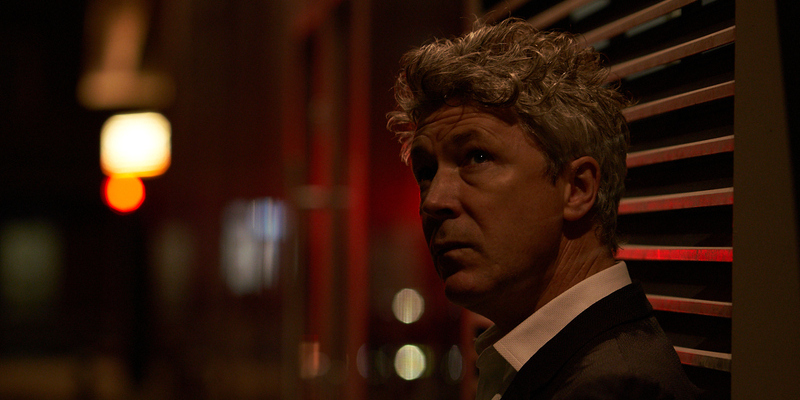
Review by
Eric Hillis
Directed by: Fintan Connolly
Starring: Aidan Gillen, Aisling Kearns, Gary Lydon, Helen Behan, Deirdre Donnelly, Liam Carney,
Camille O’Sullivan, Irma Mali, Nick Dunning, Steve Wall

Irish filmmaker Fintan Connolly has been attempting to turn
Dublin into a noir setting throughout his career, and this ambition
reaches its apogee with detective drama Barber. Striving to evoke classic Hollywood film noir (the famous horse
racing conversation between Bogart and Bacall in
The Big Sleep is awkwardly recreated here), with its
dreary Dublin setting the film lands closer to the gritty British crime
shows of the '90s, but with none of the savvy writing of the likes of
Spender, Prime Suspect or Cracker.
Having spent the last couple of decades establishing himself as a
character actor par excellence on both sides of the Atlantic, in both
movies and TV, Aidan Gillen gets a rare chance to take centre
stage. He plays Val Barber, a private investigator who was kicked out of
the police for reasons that gradually reveal themselves as the narrative
unspools. He mostly focusses on insurance fraud and cheating spouses, so
he's surprised when a wealthy woman (Deirdre Donnelly) hires him
to track down her missing 20-year-old granddaughter (Isabelle Connolly).

Using a combination of his charm and his contacts within the police,
Barber begins his investigation. The girl is nowhere to be found, but as
is usually the case, he uncovers a conspiracy of silence involving some
very powerful figures. An old adversary from his time on the force,
Inspector Quinn (Liam Carney), does his best to intimidate Barber
into dropping the investigation, but the private dick persists.
There's very little to differentiate Barber from the crowded field of
big and small screen private eyes, but Gillen gives a captivating
performance that falls closer to Elliot Gould's Philip Marlowe from
The Long Goodbye than Humphrey Bogart's Marlowe from
The Big Sleep, all nervous energy and
brittle cockiness. The script provides Gillen with none of the crackling
dialogue of either of those movies however, even when it's directly
riffing on the latter, but Gillen manages to elevate the dialogue, which
is functional at best, clunky at worst.

What distinguishes Barber from other screen PIs is his bisexuality (insert your own "Something for the weekend?" joke here),
which lead to the end of his marriage and left his teenage daughter with
some emotional scars. This subplot takes up a sizeable chunk of the
movie, distracting from the central investigation plot to such a degree
that it’s easy to forget Barber is on a case. With so much attention to
the world and the people on the protagonist's periphery,
Barber is a film that seems desperate to spawn a TV
series. It plays a lot like an extended pilot episode, with subplots
that could be fleshed out in subsequent episodes but which seem
pointless and distracting in a standalone movie.
Gillen brings enough to the title character to suggest a TV series
might be a success, but it would require a more involving set of cases
than the dreary one he's lumbered with here. The film comments on such
topics as the rapid changes in Irish society in recent years and the
MeToo movement, but it does so through clumsy dialogue exchanges (at one
point a character actually says "Do you remember when all that MeToo
stuff came out?", just in case we missed the subtext) rather than
embedding such themes organically in the narrative.

Barber often forgets it's a thriller, with a distinct
lack of thrills. The eponymous meddling dick is subjected to the usual
harassment - including the stock scene of him finding his office (which
like his apartment, is located in the sort of prime Dublin real estate
nobody of his means could dream of affording) has been ransacked – but
we never get the sense that he or anyone around him is in any real
danger. It all wraps up with a twist that plays like both Barber and the
audience has been cheated.

